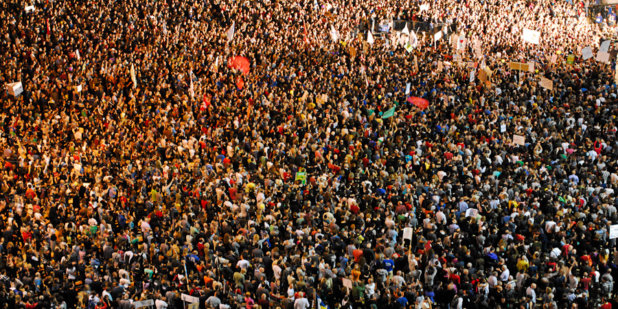- About
- Topics
- Picks
- Audio
- Story
- In-Depth
- Opinion
- News
- Donate
- Signup for our newsletterOur Editors' Best Picks.Send
Read, Debate: Engage.
"I understood what was rotten, and understood it could be changed."
From holding a senior position in the army and later on working as a financial analyst the Tell-Aviv tent revolt of 2011 metamorphosed Boaz Rakocz into running the social guard.
Boaz Rakocz studied for Bachelors and Masters in international relations at Columbia University, and then returned to Israel and worked as an analyst at a research company. He was on the well-padded side of things. The media reports of young people protesting against the high rent, setting up tents, didn't really have anything to do with him. "When the protest began, I was being skeptical and critical about it", admits 34-year-old Rakocz, from Tel Aviv, "it took me a while to join in". He helped, listened, and something began to burn inside of him. His mind was opened to a variety of new ideas, and Rakocz was sucked in.
 Boaz Rakocz
Boaz Rakocz
"I learned what flat democratic organization was, sorting things out and reaching oral agreement on issues. I was exposed to people who were more radical in their approach to the state. I began to realize that the government here is rotten and problematic, and that this protest really has the potential to change things," he says, adding his own motivation:
"I had this dream, growing up, to become a leader. When the protest started, I felt like I could achieve that dream, and I could do it in a way that was congruent with my values."
Rakocz decided to quit his job. In October 2011, he joined the founding team of the Social Guard, a civilian group supervising the Israeli parlament´s activity and promoting more egalitarian legislation – which became one of the main movements that stem from the protest, and one of the most prominent forces in the fight for transparency and for public involvement in governmental institutions. One year later, in July 2012, Rakocz was made CEO of the organisation, and started collecting a salary. He was doing that for three years, when he quit and started working on "The Whistle", an organisation which is already getting donations, and is intended, as he puts it, to act as a "watchdog of the media, encouraging cooperation and civilian influence on journalists' work, in the public interest.
“The social sector isn't as profitable,” he says. and I often ask myself why I need this, with my records, I could easily find a job in home defence and cyber, where some of my friends are working, but I believe a change is possible."
